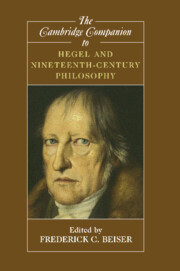Book contents
- Frontmatter
- Introduction: The Puzzling Hegel Renaissance
- 1 Hegel: A Life
- 2 Ancient Skepticism, Modern Naturalism, and Nihilism in Hegel’s Early Jena Writings
- 3 Hegel’s Phenomenology as a Systematic Fragment
- 4 The Independence and Dependence of Self-Consciousness: The Dialectic of Lord and Bondsman in Hegel's Phenomenology of Spirit
- 5 Hegel’s Logic
- 6 Hegel’s Idealism
- 7 Hegel and Hermeneutics
- 8 Hegel’s Social Philosophy
- 9 Hegel’s Philosophy of Religion
- 10 Hegel and Mysticism
- 11 Philosophizing about Nature: Hegel’s Philosophical Project
- 12 Hegel’s Criticism of Newton
- 13 The Logic of Life: Hegel’s Philosophical Defense of Teleological Explanation of Living Beings
- 14 Hegel and Aesthetics: The Practice and “Pastness” of Art
- 15 The Absence of Aesthetics in Hegel’s Aesthetics
- Bibliography
- Index
14 - Hegel and Aesthetics: The Practice and “Pastness” of Art
Published online by Cambridge University Press: 28 July 2009
- Frontmatter
- Introduction: The Puzzling Hegel Renaissance
- 1 Hegel: A Life
- 2 Ancient Skepticism, Modern Naturalism, and Nihilism in Hegel’s Early Jena Writings
- 3 Hegel’s Phenomenology as a Systematic Fragment
- 4 The Independence and Dependence of Self-Consciousness: The Dialectic of Lord and Bondsman in Hegel's Phenomenology of Spirit
- 5 Hegel’s Logic
- 6 Hegel’s Idealism
- 7 Hegel and Hermeneutics
- 8 Hegel’s Social Philosophy
- 9 Hegel’s Philosophy of Religion
- 10 Hegel and Mysticism
- 11 Philosophizing about Nature: Hegel’s Philosophical Project
- 12 Hegel’s Criticism of Newton
- 13 The Logic of Life: Hegel’s Philosophical Defense of Teleological Explanation of Living Beings
- 14 Hegel and Aesthetics: The Practice and “Pastness” of Art
- 15 The Absence of Aesthetics in Hegel’s Aesthetics
- Bibliography
- Index
Summary
Hegel's achievements as a philosopher of art have been both widely recognized and endlessly disputed. His position as the “father of art history” (Gombrich) has been confirmed Oedipally, by a succession of figures in that profession who have criticized Hegel's alleged tendencies to (among other things) progressivism, essentialism and historical determinism. While he is regarded by many (Henrich, Danto, T. J. Clark) as a philosophical forerunner of theoretical discourse on modernism in art, his own (in)famous remarks about the “end of art” are often cited against him as evidence of an inability to imagine the development of just such later movements. He is rightly regarded as having pushed forward the independent status of art in its own right, yet this independence is frequently held to be vitiated by the demands of his own philosophical system.
The difficulty of assessing Hegel's achievements in aesthetics has led to a number of attempts to rescue some version of an Hegelian aesthetics by going beyond what the presumably “official” account itself offers. In what follows, I want to examine what resources might lie within Hegel's aesthetics for a view of the practice of art, something I hope will shed light not only on some of the famous systematic difficulties in Hegel's aesthetics but also on questions such as the endlessly interpreted “end of art” thesis.
- Type
- Chapter
- Information
- Publisher: Cambridge University PressPrint publication year: 2008
- 3
- Cited by



